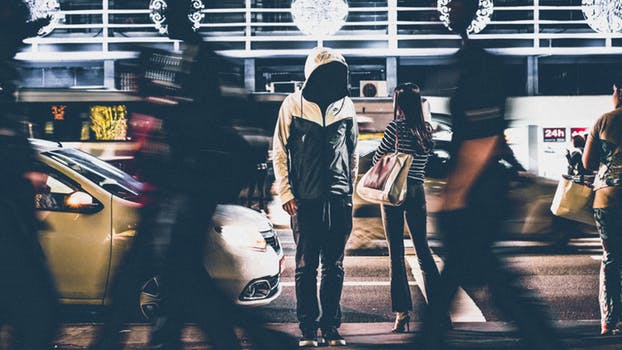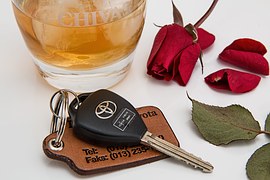Can Baltimore Police Just Set up Roadblocks for Sobriety Checkpoints?

Can Baltimore Police Just Set up Roadblocks for Sobriety Checkpoints? Yes. They Can. In MICHIGAN DEPT. OF STATE POLICE v. SITZ, 496 U.S. 444 (1990), the Supreme Court approved the use of sobriety checkpoints as an aid to apprehend those in violation the DUI laws. The subject checkpoint was used by Michigan. In the Sitz case “[t]he Michigan State Police Department and its director, established a highway sobriety checkpoint program with guidelines governing checkpoint operations, site selection, and publicity. During the only operation to date, 126 vehicles passed through the checkpoint, the average delay per vehicle was 25 seconds, and two drivers were arrested for driving under the influence of alcohol”. Attorney Eric T. Kirk says the Court determined that on these facts:
Because “checkpoints are selected pursuant to guidelines, and uniformed officers stop every vehicle [limiting discretion in who was stopped]” the checkpoint survived a challenge under the Fourth Amendment.

Can Baltimore Police Just Set up Roadblocks for Sobriety Checkpoints? They do. These specific factors: randomness, no discretion were key elements in the court analysis, and remain so. Not every checkpoint passes the test. Note that in Delaware v. Prouse, the U.S Supreme Court “disapproved random stops made by Delaware Highway Patrol officers in an effort to apprehend unlicensed drivers and unsafe vehicles…” observing “that no empirical evidence indicated that such stops would be an effective means of promoting roadway safety and….that the random stops involved the kind of standardless and unconstrained discretion [which] is the evil the Court has discerned when in previous cases it has insisted that the discretion of the official in the field be circumscribed, at least to some extent.”
You Have A DUI As a Result of a Baltimore DUI Checkpoint: Next steps
Analyzing the legality of the stop in terms of planning, structure, execution, and results, is often a vital first step in mounting an effective defense. A Fourth Amendment-compliant DUI checkpoint is not simply a traffic trap—it is a carefully planned, narrowly tailored, and publicly visible law enforcement tool designed to promote roadway safety. When law enforcement adheres to clearly defined legal standards, DUI checkpoints are generally upheld as constitutional. But any deviation from those standards—such as arbitrary stops, lack of oversight, or failure to minimize the intrusion—can result in the suppression of evidence and the invalidation of arrests arising from the checkpoint. If you are stopped, and charged at a checkpoint that violates the 4th Amendment in one of those components, the court may not allow the “fruits” [e.g. the breathalyzer] into evidence. Understanding what is permissible is often the key to determining what is disallowed.
What a Fourth Amendment-Compliant DUI Checkpoint Should Look Like
Can Baltimore Police Just Set up Roadblocks for Sobriety Checkpoints? Yes, but there are constraints. The Fourth Amendment to the U.S. Constitution protects individuals against unreasonable searches and seizures. Normally, this means that police must have individualized suspicion or probable cause before stopping a vehicle. However, the U.S. Supreme Court has carved out a narrow exception to this rule for sobriety checkpoints, or DUI checkpoints, provided that certain constitutional safeguards are in place. A Fourth Amendment-compliant DUI checkpoint must strike a balance between the public interest in preventing drunk driving and the individual’s right to privacy and freedom from arbitrary government intrusion.
Baltimore DUI Checkpoints: Key Constitutional Requirements
1. Advance Planning by Supervisory Personnel
Can Baltimore Police Just Set up Roadblocks for Sobriety Checkpoints? The recurring answer is “Yes” but decision to establish a checkpoint must be made by high-ranking law enforcement officials, in advance not field officers in the moment. This includes selecting the time, location, and operational procedures ahead of time. Arbitrary or discretionary stops by officers on the scene are not permitted.
2. Neutral Criteria for Stopping Vehicles
The method of selecting which cars to stop must be predetermined and objective, such as stopping every vehicle, or every third vehicle. Officers may not stop drivers based on appearance, race, or behavior unless there is independent probable cause.
3. Location Selection Must Be Reasonable
The site chosen for the checkpoint should be based on empirical data, such as past DUI incidents or arrests. It should also be in a location that is safe for both officers and motorists and allows drivers to stop without danger or confusion.
4. Visible and Adequate Signage
To reduce the level of intrusion, there must be clear signage and lighting that alerts drivers in advance that they are approaching a law enforcement checkpoint. Flashing lights, signs, cones, and marked police vehicles are typically used.
5. Minimally Intrusive Stops
The detention of drivers should be brief—just long enough for officers to observe signs of intoxication (e.g., slurred speech, odor of alcohol, bloodshot eyes). If no signs are observed, the driver must be promptly allowed to proceed.
6. Public Notice
Although not always required by courts, some jurisdictions consider advance publicity an important factor in determining reasonableness. Some jurisdictions in Maryland publicize the checkpoint beforehand which can serve as both a deterrent and a signal that the checkpoint is part of a legitimate safety program—not an arbitrary law enforcement tactic.
According to NHTSA, “Thirty-eight States and the District of Columbia permit sobriety checkpoints as part of their impaired-driving enforcement, but they vary how regularly they are conducted. In those States where checkpoints were permitted by State law, 97% of State patrol agencies and 55% of local law enforcement agencies reported conducting sobriety checkpoints”.
Maryland conducts DUI checkpoints, and they are considered legal under Maryland law.
MARYLAND DEPARTMENT OF TRANSPORTATION URGES EVERYONE TO BE SERIOUS ABOUT SAFETY: learn more
Baltimore City Police May Announce Checkpoints: Learn where. Learn When
Standing accused and on trial in a DUI case is a life-altering experience. I extend a no-cost, no-obligation case analysis and personal, confidential conference and strategy session to all prospective clients. If you have been accused of a crime, it is vital that you act quickly to safeguard your freedom, job, and good name.
Technical Information
Eric T. Kirk is a Baltimore Personal Injury Lawyer with over 30 years of trial experience. Practice areas: Insurance Claim Denial, Auto Accidents, Wrongful Death.
Location: Baltimore, Maryland. ZIP codes served: 21201, 21202, 21205, 21206, 21209, 21210, 21211, 21212, 21213, 21214, 21215, 21216, 21217, 21218, 21223, 21224, 21225, 21226, 21229, 21230, 21231, 21239.
Neighborhoods served: Canton, Federal Hill, Fells Point, Mount Vernon, Patterson Park, Harbor East, Inner Harbor, Hampden, Charles Village, Highlandtown, Roland Park, Upper Fells Point, Remington, Belair-Edison, Morrell Park, Westport, Brooklyn, Carroll Park, Cherry Hill, Medfield, Bayview, Upton, West Baltimore, Middle East, Park Heights, Reservoir Hill, Cedonia, Guilford, Lauraville, Govans, Homeland, Waverly, Edmondson Village, Washington Village, Sandtown-Winchester, Madison Park, Berea, Barclay, Greenmount West, Butcher's Hill, Greektown, Station North, Old Goucher, Seton Hill, Otterbein, Pigtown, Poppleton, Franklin Square, Hollins Market, Carrollton Ridge, Druid Hill Park, Coppin Heights, Easterwood, Mondawmin, Penn North, Bolton Hill, Oliver, Clifton Park, Northwood, Hamilton, Beverly Hills, Coldstream Homestead Montebello, Pen Lucy, Ednor Gardens-Lakeside, Cold Spring, Original Northwood, Waltherson, Arcadia, Loch Raven, Montebello, Moravia-Walther, Overlea, Ramblewood, Rosemont, Taylor Heights, Westfield, Baltimore Highlands, Brewers Hill, CARE, Downtown, East Baltimore Midway, Greenmount Cemetery, Johnston Square, Madison-Eastend, McElderry Park, Milton-Montford, Patterson Place, South Clifton Park, University of Maryland, Mid-Town Belvedere, Dunbar-Broadway, Gay Street, Jonestown, Little Italy, O'Donnell Heights, Patterson Park Neighborhood, Upper Fells Point, Washington Hill, Ridgely's Delight, Riverside, Sharp-Leadenhall, Stadiums Area, Union Square, Beechfield, Dickeyville, Edgewood, Edmondson Village, Franklintown, Gwynns Falls, Hunting Ridge, Irvington, Penrose/Fayette Street Outreach, Rognel Heights, Saint Agnes, Shipley Hill, Ten Hills, Tremont, Uplands, Violetville, Wakefield, Westgate, Yale-Heights, Ashburton, Bridgeview-Greenlawn, Burleith-Leighton, Central Forest Park, Coppin Heights/Ash-Co-East, Dolfield, Dorchester, Druid Heights, East Arlington, Easterwood, Evergreen Lawn, Forest Park, Franklintown Road, Garwyn Oaks, Grove Park, Hanlon Longwood, Harlem Park, Heritage Crossing, Howard Park, Liberty Square, Midtown-Edmondson, Mosher, Mount Holly, Northwest Community Action, Panway/Braddish Avenue, Parkview/Woodbrook, Penn North, Purnell, Reservoir Hill, Rosemont, Rosemont Homeowners/Tenants, Sandtown-Winchester, Upton, Walbrook, West Arlington, West Forest Park, Winchester, Windsor Hills.
Reduced Fee Program: 30% pre-suit, 35% litigated cases.



